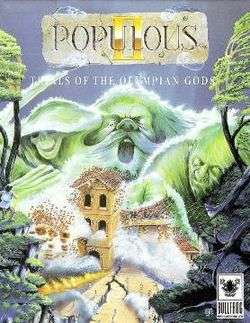Populous II: Trials of the Olympian Gods
| Populous II: Trials of the Olympian Gods | |
|---|---|
 Cover art | |
| Developer(s) | Bullfrog |
| Publisher(s) | Electronic Arts |
| Designer(s) | Peter Molyneux |
| Series | Populous |
| Platform(s) | Amiga, Atari ST, MS-DOS, Mac OS, Mega Drive, NEC PC-9801, SNES |
| Release date(s) | 1991 |
| Genre(s) | Real-time strategy, god game |
| Mode(s) | Single-player, two-player |
Populous II: Trials of the Olympian Gods is a 1991 strategy video game in the Populous series for the Amiga, Atari ST and MS-DOS-based computers, developed by Bullfrog Productions. Populous II was remade and remastered for the Nintendo DS in 2008. Populous II is a direct sequel to Bullfrog's earlier game Populous and is one of the company's most notable games.
Like its predecessor, Populous II is a god game, where the player is guiding his people in battle against the followers of an enemy god. Whereas Populous only generally alluded to undefined deities, Populous II is specifically set under the backdrop of Greek mythology. The player is a demigod, one of Zeus's countless children with mortal women, and has to battle one Greek deity at a time until finally facing his father. Zeus has promised to let the player into the Pantheon on Olympus if he can survive all the battles.
A data disk was also released for Populous II, titled Populous II: The Challenge Games. This was set in Japanese mythology instead of Greek, and had each level as its individual challenge, slightly in the style of a puzzle game.
Gameplay
Populous II is considerably more versatile and has a great deal more "divine intervention" effects than the original game. Populous would only bestow eight powers on the player but the sequel, Populous II has twenty-nine (30 in PC version). These are sub-divided into six categories of effect: earth, water, wind, fire, plants and people. The six categories have an individual "manna meter" which needs to be filled to a certain level to enable specific powers for usage. Manna is generated by population existing over time - the larger the population, the more manna is generated. Use of a power will deplete a set amount of manna and repeated use of the more devastating powers will empty the manna reservoir.
Similar to the "knight" effect in Populous, each effect category includes a "hero", allowing the player to transform his or her leader into one of six legendary figures in Greek mythology who will wander around the map attacking enemies or perform some other nefarious act.
If either side controlled a certain percentage of the map, usually 75%, ancient Greek monsters would be unleashed upon the map, such as the Colossus or Medusa, which would wander from one side to another leaving a trail of destruction in their wake. This was usually seen as a cue to hurry up and complete the map because the monsters were indestructible and were indiscriminate in who they killed.
Upon the successful completion of a map, the player will be awarded between one and five small experience points depending on scale of victory, number and types of powers used and length of battle which can then be used to boost capabilities in any of the six categories. This will improve accuracy and duration of powers and reduce the amount of manna needed to activate abilities.
The game features 1000 maps and the player would advance to the next map depending on performance in the battle - an exceptional performance would allow the player to skip several maps, a more unsatisfying performance would bring the player no farther than three or less maps.
One of the effects in the plants category is a deadly fungus that is planted on the ground, changing its shape and killing anyone who steps on it. Although the manual does not explain how it grows, it is easy to see that its shape changing obeys the rules of Conway's Game of Life.
Reception
Computer Gaming World in 1992 stated that "Populous II is an elaborate program that is instantly absorbing and addictive",[1] and later named it one of the year's best strategy games.[2] In a 1993 survey of pre 20th-century strategy games the magazine gave the game three-plus stars out of five[3]
References
- ↑ Eden, Maxwell (June 1992). "Divine Mana-gement". Computer Gaming World. p. 34. Retrieved 24 November 2013.
- ↑ "CGW Salutes The Games of the Year". Computer Gaming World. November 1992. p. 110. Retrieved 4 July 2014.
- ↑ Brooks, M. Evan (June 1993). "An Annotated Listing of Pre-20th Century Wargames". Computer Gaming World. p. 136. Retrieved 7 July 2014.